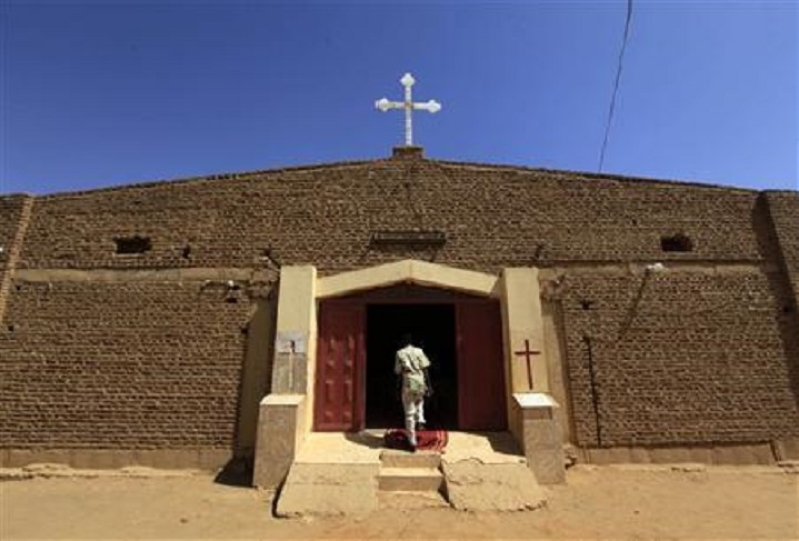
In further efforts to help a Muslim businessman take over church property, police in Omdurman, Sudan evicted two church leaders and their families from their houses, sources said.
Police on Tuesday (Aug. 15) raided the two houses belonging to the Sudan Presbyterian Evangelical Church (SPEC), one near the Omdurman Evangelical Church and the other attached to Omdurman Evangelical School, both close to each other in the city across the Nile River from Khartoum. They evicted the families of the Rev. Yahia Abdelrahim Nalu, SPEC moderator, and the Rev. Sidiq Abdalla, a SPEC pastor who has two children, ages 8 and 10.
The action was the latest show of force in a government-aided bid to help Muslim businessman Hisham Hamad Al-Neel take over the church property for investment, sources said. Police told the pastors they were carrying out a court order.
The families, who remain homeless, told Morning Star News they were terrorized when police pounded on the doors shouting threats.
"They came and knocked on the door strongly, then said, 'Should you not open, we will have to break it by force to get in," Pastor Nalu, 47-year-old father of a 1-year-old boy, told Morning Star News.
Pastor Nalu, his wife and son have yet to find shelter elsewhere, he said.
"The situation is very difficult, and we are living on the street," he said.
SPEC leaders said they have appealed to nullify the evictions, but that any resolution would not come soon.
Leadership of SPEC remains in the hands of government-appointed committee members even after a court ruled in November 2016 that the appointments were illegal, sources said. In the effort to take over SPEC properties, police on March 27 accused staff members of a Christian school in Sudan of obstructing the work of the Muslim-owned business trying to take it over.
Police in Omdurman arrested 12 staff members of a Christian school and the next day prevented others from leaving the campus, they said. The Christians were released the night they were arrested.
A church elder on April 3 died from injuries sustained in a raid on the embattled Christian school by supporters of the Muslim business interest in Omdurman. Younan Abdullah, an elder with Bahri Evangelical Church, died in a hospital after being stabbed while he and others were defending women at the Evangelical School of Sudan, SPEC sources told Morning Star News.
On March 16 about 20 policemen aboard a truck forcefully entered the school compound, arrested three Christian teachers including the headmaster, Daud Musa, and took them to Omdurman's central division police station, sources said. Also arrested were Christian teachers Yahya Elias and the late Abdullah, all of the SPEC.
They were released on bail after eight hours, charged with obstructing the work of those attempting to take over the school.
The arrests came nearly a month after authorities arrested and held overnight four educators from the same school, including Musa, before releasing them on bail. They were accused of destroying a sign belonging to Education Vision. The Christians strongly denied the accusation.
The Evangelical School of Sudan is one of several SPEC schools throughout Sudan.
In its campaign to rid the country of Christianity, Sudan has designated 25 church buildings for destruction, and on Aug. 2 it demolished a Baptist church in Omdurman. On May 7 Khartoum state authorities in Sudan demolished a church building in the Khartoum suburb of Soba al Aradi, which began as a refugee camp for south Sudanese. A bulldozer sent by Jebel Aulia locality and the Ministry of Planning and Urban Development destroyed the Sudanese Church of Christ (SCOC) building.
Authorities had notified church leaders of the impending demolition just a week prior. The government reportedly claimed the churches were built on land zoned for residential or other uses, or were on government land, but church leaders said it is part of wider crack-down on Christianity.
Harassment, arrests and persecution of Christians have intensified since the secession of South Sudan in July 2011. The Sudanese Minister of Guidance and Endowments announced in April 2013 that no new licenses would be granted for building new churches in Sudan, citing a decrease in the South Sudanese population.
Sudan since 2012 has expelled foreign Christians and bulldozed church buildings on the pretext that they belonged to South Sudanese. Besides raiding Christian bookstores and arresting Christians, authorities threatened to kill South Sudanese Christians who do not leave or cooperate with them in their effort to find other Christians.
Sudan fought a civil war with the south Sudanese from 1983 to 2005, and in June 2011, shortly before the secession of South Sudan the following month, the government began fighting a rebel group in the Nuba Mountains that has its roots in South Sudan.
Due to its treatment of Christians and other human rights violations, Sudan has been designated a Country of Particular Concern by the U.S. State Department since 1999, and the U.S. Commission on International Religious Freedom recommended the country remain on the list in its 2017 report.
Sudan ranked fifth on Christian support organization Open Doors' 2017 World Watch List of countries where Christians face most persecution.







